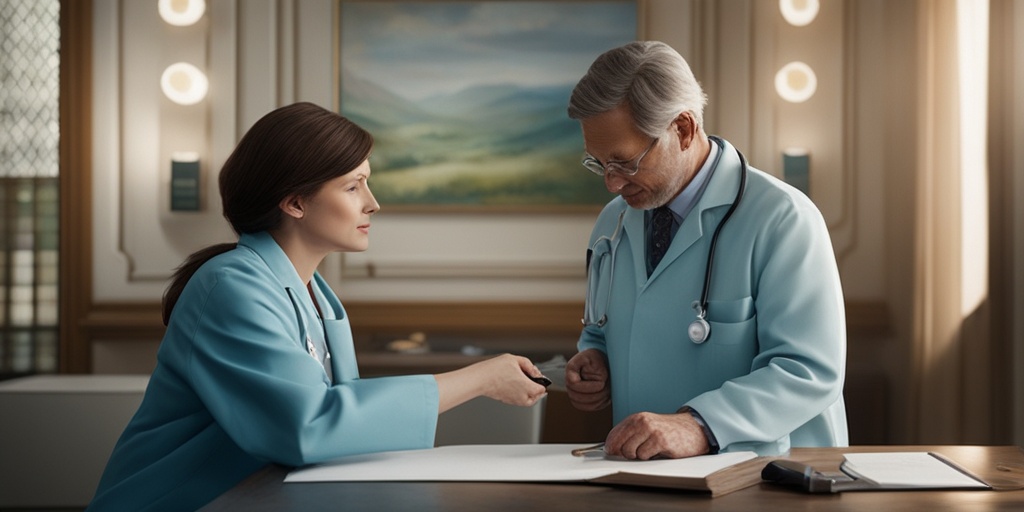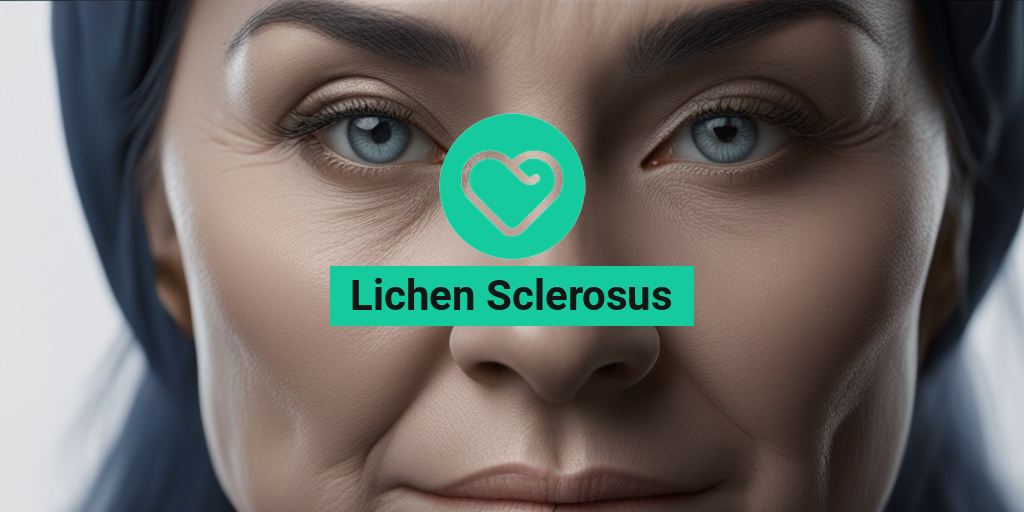What Is Lichen Sclerosus?
Lichen sclerosus is a chronic skin condition that affects millions of people worldwide, yet it remains largely misunderstood. If you’re reading this, chances are you or someone you know has been diagnosed with this condition, and you’re looking for answers. So, let’s dive in and explore what lichen sclerosus is all about! 🤔
A Chronic Skin Condition
Lichen sclerosus is a chronic inflammatory skin condition characterized by the appearance of white patches or plaques on the skin. These patches can appear anywhere on the body, but they most commonly affect the genital and anal areas. The condition is more common in women, especially after menopause, but it can affect anyone, regardless of age or gender.
Causes and Risk Factors
The exact cause of lichen sclerosus is still unknown, but research suggests that it may be linked to hormonal changes, autoimmune disorders, and genetic predisposition. Some people may be more prone to developing lichen sclerosus due to certain risk factors, such as:
- Family history of the condition
- Hormonal changes, such as menopause or pregnancy
- Autoimmune disorders, like thyroid disease or vitiligo
- Injury or trauma to the affected area
While the exact cause of lichen sclerosus remains a mystery, understanding the risk factors can help you take proactive steps to manage the condition.
Lichen Sclerosus Symptoms
So, how do you know if you have lichen sclerosus? The symptoms can vary from person to person, but here are some common signs to look out for:
Physical Symptoms
The most common symptoms of lichen sclerosus include:
- White, patchy, or scaly skin lesions
- Itching, burning, or discomfort in the affected area
- Painful sexual intercourse (in women)
- Bleeding or tearing of the skin (in severe cases)
These physical symptoms can be uncomfortable and even painful, but there are ways to manage them.
Emotional and Psychological Symptoms
Lichen sclerosus can also take a toll on your emotional and psychological well-being. Many people with the condition experience:
- Anxiety or depression
- Low self-esteem or body image issues
- Fear or avoidance of intimacy
- Feeling isolated or alone
It’s essential to remember that you’re not alone in this journey. Seeking support from loved ones, healthcare professionals, or online resources like Yesil Health AI (yesilhealth.com) can make a significant difference in managing your symptoms and improving your overall quality of life.
Stay tuned for the next part of this series, where we’ll explore lichen sclerosus treatment options and ways to manage the condition. 💊

Lichen Sclerosus Causes and Risk Factors
Lichen sclerosus is a chronic skin condition that affects millions of people worldwide, causing discomfort, pain, and emotional distress. While the exact causes of lichen sclerosus are still not fully understood, research has identified several factors that may contribute to its development. In this section, we’ll delve into the possible causes and risk factors associated with lichen sclerosus.
Genetic Predisposition
Research suggests that lichen sclerosus may have a genetic component, as it tends to run in families. If you have a family history of autoimmune disorders, such as thyroid disease or vitiligo, you may be more likely to develop lichen sclerosus.
Hormonal Imbalance
Hormonal changes, particularly a decrease in estrogen levels, may contribute to the development of lichen sclerosus. This is why the condition often affects postmenopausal women and is more common in women who have had a hysterectomy.
Autoimmune Disorders
Lichen sclerosus is often associated with other autoimmune disorders, such as thyroid disease, vitiligo, and alopecia areata. This suggests that the condition may be triggered by an abnormal immune response.
Injury or Trauma
In some cases, lichen sclerosus may develop after an injury or trauma to the affected area. This could be due to the body’s response to the injury, which may trigger an autoimmune reaction.
Other Possible Causes
Other potential causes of lichen sclerosus include:
- Infections, such as yeast or bacterial infections
- Allergic reactions to certain substances
- Environmental factors, such as exposure to toxins or radiation
It’s essential to note that lichen sclerosus is not caused by poor hygiene, sexual activity, or poor diet. 🚿
Lichen Sclerosus Diagnosis
Diagnosing lichen sclerosus can be challenging, as the symptoms can be similar to those of other conditions. A thorough diagnosis typically involves a combination of physical examination, medical history, and laboratory tests.
Physical Examination
A healthcare provider will perform a physical examination to look for signs of lichen sclerosus, such as:
- White, patchy skin
- Thinning or thickening of the skin
- Fissures or cracks in the skin
- Bleeding or bruising
Medical History
Your healthcare provider will ask about your medical history, including any previous skin conditions, autoimmune disorders, or hormonal imbalances.
Laboratory Tests
Lab tests may be ordered to rule out other conditions that may cause similar symptoms. These tests may include:
- Blood tests to check for autoimmune disorders
- Biopsy to examine skin tissue
- Culture tests to check for infections
A definitive diagnosis of lichen sclerosus is typically made by a dermatologist or other healthcare specialist based on the results of these tests and examinations. 🔍
Early diagnosis and treatment are crucial in managing lichen sclerosus and preventing complications. If you suspect you may have lichen sclerosus, don’t hesitate to consult a healthcare professional. 💊

Lichen Sclerosus Treatment
Lichen sclerosus is a chronic skin condition that requires ongoing management and treatment to alleviate its symptoms. While there is no cure for lichen sclerosus, various treatment options can help reduce discomfort, prevent further skin damage, and improve the quality of life for those affected.
Topical Corticosteroids
Topical corticosteroids are the most commonly prescribed treatment for lichen sclerosus. These creams or ointments reduce inflammation, relieve itching, and prevent further skin thickening. Mild to moderate cases of lichen sclerosus often respond well to topical corticosteroids, which can be applied directly to the affected area.
Topical Immune Modulators
Topical immune modulators, such as pimecrolimus or tacrolimus, can be used to reduce inflammation and prevent further skin damage. These medications work by suppressing the immune system’s response, which can contribute to the development of lichen sclerosus.
Phototherapy
Phototherapy, also known as light therapy, involves exposing the affected skin to specific wavelengths of light. This treatment can help reduce inflammation, relieve itching, and improve skin texture. Ultraviolet B (UVB) phototherapy is often used to treat lichen sclerosus.
Surgical Interventions
In severe cases of lichen sclerosus, surgical interventions may be necessary to remove affected skin or repair damaged tissue. This is often the case for women with vulvar lichen sclerosus, where surgical removal of the affected skin can help alleviate symptoms and improve quality of life.
Lichen Sclerosus Home Remedies
While medical treatment is essential for managing lichen sclerosus, there are several home remedies that can help alleviate symptoms and improve skin health. Keep in mind that these remedies should not replace medical treatment, but rather be used in conjunction with it.
Moisturizing
Moisturizing is essential for people with lichen sclerosus, as it helps to soothe dry, itchy skin and reduce inflammation. Use a gentle, fragrance-free moisturizer that is rich in emollients and humectants. Apply immediately after bathing or showering, while the skin is still damp. 💧
Oatmeal Baths
Oatmeal baths can help to soothe itchy, inflamed skin and reduce discomfort. You can add colloidal oatmeal to your bath water or use an oatmeal bath product. Soak in the bath for 15-20 minutes, 2-3 times a week. 🛀
Aloe Vera
Aloe vera has anti-inflammatory and soothing properties that can help to reduce itching and inflammation. Apply aloe vera gel directly to the affected area, 2-3 times a day. 🌿
Tea Tree Oil
Tea tree oil has antiseptic and anti-inflammatory properties that can help to reduce inflammation and prevent infection. Mix a few drops of tea tree oil with a carrier oil, such as coconut or olive oil, and apply it to the affected area. 🌿
Remember to always consult with a healthcare professional before trying any new treatments or home remedies, especially if you have a severe case of lichen sclerosus or are experiencing severe symptoms. They can help you develop a personalized treatment plan that combines medical treatment with home remedies to manage your symptoms and improve your quality of life. 💊

Lichen Sclerosus Complications
Lichen sclerosus is a chronic skin condition that can lead to various complications if left untreated or poorly managed. While the condition itself can be uncomfortable and painful, the potential complications can have a significant impact on a person’s quality of life. In this section, we’ll explore some of the possible complications associated with lichen sclerosus.
Increased Risk of Skin Cancer
One of the most serious complications of lichen sclerosus is the increased risk of developing skin cancer, particularly squamous cell carcinoma. This is because the chronic inflammation and scarring associated with lichen sclerosus can increase the risk of genetic mutations, leading to cancerous cell growth. It’s essential for individuals with lichen sclerosus to undergo regular skin checks and to report any changes in their skin to their doctor.
Vaginal Adhesions and Narrowing
Lichen sclerosus can cause the vaginal tissues to become inflamed and scarred, leading to adhesions and narrowing of the vaginal opening. This can make sexual intercourse painful and difficult, and can also lead to difficulties with vaginal examinations and childbirth.
Urinary Tract Problems
The chronic inflammation and scarring associated with lichen sclerosus can also affect the urinary tract, leading to problems such as urinary retention, incontinence, and recurrent urinary tract infections.
Emotional and Psychological Distress
Lichen sclerosus can have a significant impact on a person’s emotional and psychological well-being. The chronic pain, discomfort, and embarrassment associated with the condition can lead to anxiety, depression, and low self-esteem. It’s essential for individuals with lichen sclerosus to seek support from healthcare professionals, support groups, and loved ones to manage these emotional and psychological challenges.
Lichen Sclerosus and Vulvodynia
Vulvodynia is a chronic pain condition that affects the vulva, and it’s often associated with lichen sclerosus. In fact, many women with lichen sclerosus also experience vulvodynia. So, what’s the connection between these two conditions?
Shared Symptoms
Both lichen sclerosus and vulvodynia can cause chronic pain, discomfort, and itching in the vulval area. The symptoms of these conditions can be similar, making it challenging to diagnose and treat them accurately.
Increased Risk of Vulvodynia
Research suggests that women with lichen sclerosus are at a higher risk of developing vulvodynia. This is because the chronic inflammation and scarring associated with lichen sclerosus can lead to nerve damage and sensitization, increasing the risk of chronic pain.
Treating Both Conditions
Treating lichen sclerosus and vulvodynia requires a comprehensive approach that addresses both conditions simultaneously. This may involve a combination of topical creams, oral medications, and lifestyle changes to manage symptoms and prevent complications. It’s essential for individuals with both conditions to work closely with their healthcare provider to develop a personalized treatment plan.
💡 Remember, if you’re experiencing symptoms of lichen sclerosus or vulvodynia, it’s essential to seek medical attention from a qualified healthcare professional. With the right diagnosis and treatment, it’s possible to manage these conditions and improve your quality of life.

Frequently Asked Questions about Lichen Sclerosus
What is Lichen Sclerosus?
Lichen sclerosus is a chronic skin condition characterized by the appearance of white patches on the skin, often accompanied by itching, discomfort, and pain. It can affect any part of the body, but it most commonly occurs on the vulva, penis, and anus.
What are the Symptoms of Lichen Sclerosus?
The symptoms of lichen sclerosus can vary from person to person, but common symptoms include:
- White patches or plaques on the skin
- Itching, burning, or discomfort in the affected area
- Pain during sexual intercourse
- Bleeding or tearing of the skin
- Fissures or cracks in the skin
What Causes Lichen Sclerosus?
The exact cause of lichen sclerosus is unknown, but it is believed to be related to an autoimmune response, hormonal changes, and genetic predisposition.
How is Lichen Sclerosus Diagnosed?
Lichen sclerosus is typically diagnosed through a physical examination, medical history, and biopsy of the affected skin.
What are the Treatment Options for Lichen Sclerosus?
Treatment for lichen sclerosus usually involves a combination of topical corticosteroids, immunomodulators, and pain management medications. In severe cases, surgery may be necessary.
Can Lichen Sclerosus be Cured?
While there is no cure for lichen sclerosus, treatment can help manage symptoms and prevent complications. It is essential to work with a healthcare provider to develop a personalized treatment plan.
Is Lichen Sclerosus Contagious?
No, lichen sclerosus is not contagious and cannot be spread through sexual contact or other means.
Can Lichen Sclerosus Affect Fertility?
Lichen sclerosus does not directly affect fertility, but it can cause sexual dysfunction and pain, which may impact a person’s ability to conceive.
How Can I Manage Lichen Sclerosus?
Managing lichen sclerosus involves a combination of medical treatment, lifestyle changes, and self-care practices, such as:
- Avoiding irritants and allergens
- Practicing good hygiene
- Wearing loose, breathable clothing
- Using gentle, fragrance-free products
- Engaging in stress-reducing activities
Where Can I Find Support for Lichen Sclerosus?
There are several resources available for people with lichen sclerosus, including:
- Lichen Sclerosus Support Network (LSSN)
- National Vulvodynia Association (NVA)
- American Academy of Dermatology (AAD)
- Online forums and support groups
Remember, it’s essential to consult with a healthcare provider for personalized advice and treatment. 💊




